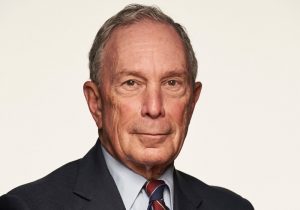The triple threat of philanthropy, politics, and business have made Michael Bloomberg a household name, but what made him so successful?
Bloomberg’s is a classic underdog tale. The former NYC mayor and Founder of Bloomberg L.P. came from humble beginnings. Born in Boston, he grew up in a middle-class home, working to pay his way through a Bachelor’s degree in electrical engineering at Johns Hopkins University. Following college, Bloomberg earned a graduate degree from Harvard Business School before starting at Salomon Brothers, a securities brokerage, in 1966. Fifteen years later, Bloomberg faced a major life hurdle when Phibro Corporation bought the legendary Wall Street firm and fired him. Instead of wallowing, Bloomberg took the $10 million he received for his equity in Salomon and created an in-house computerized financial system, designed to provide real-time market data and other analytics to infuse the financial system with transparency and fairness. After building up Innovative Market Systems (IMS), a startup which began in a small one-room office, but later renamed itself Bloomberg L.P., Bloomberg eventually became a three-term mayor in New York City (2002-2014), leading the city’s resurgence following the 9/11 terrorist attacks.
Bloomberg has attributed his success to a few personality traits. In an interview with Forbes, he stated that an individual will “inevitably face problems different from the ones [they] anticipated. Sometimes [they’ll] have to ‘zig’ when the blueprint says ‘zag’.” In addition to flexibility, he’s also credited his grit and perseverance, highlighting his time building up the company when he had to work 14 hours while his startup ran at a loss. And, in an interview with CNBC, Bloomberg emphasized the importance of collaboration: “My advice is [to] get rid of the words, ‘I and me,’ and switch to, ‘we and us’,” he said.
While these keys are undoubtedly important, Bloomberg’s most important contributor is, arguably, his luck. Before you scroll away, let’s define luck as Roman philosopher Seneca did: “what happens when preparation meets opportunity.” Bloomberg has demonstrated this ability time and again. Bloomberg never would’ve built his corporate empire if he hadn’t been let go from his first investment banking job at Salomon. Unlike some who would have viewed this as a roadblock, he took advantage of this as an opportunity. He seized his chance to serve his city as mayor following the 9/11 terrorist attacks, sensing a need for his political beliefs following that tragedy.
Of course, the only reason he was able to capitalize on these opportunities was thanks to his preparation, even though he might not have fully known what he was preparing for. Beginning at a young age, Bloomberg always worked hard, as he demonstrated when he became one of the youngest Eagle Scouts in history at 12 years old. During his time at Salomon, Bloomberg gained professional and industry experience that would prove invaluable down the line. Through his experiences, he was able to create the idea of the terminal which would eventually be used worldwide. Lastly, he cultivated relationships which came in handy when he established his company along with three of his friends.
The key to success lies in several attributes, as Bloomberg himself has stated. While many success stories utilize the same characteristics, Bloomberg’s ability to prepare and take advantage of opportunities—or luck—is what makes him stand out.




















